Shobha Warrier in Chennai
Soorya Krishnamoorthy is the founder-director of the Soorya Stage and Film Society that promotes Indian arts and culture. The light and sound shows directed by him have won him many national awards.
Malayalam film Melvilasom (Address) that released last month was based on one of his plays. Directed by debutant director Madhav Ramadasan, it was touted as one of the best Malayalam films made in recent times.
Melvilasom depicts an army court martial and has only one set -- the court room -- and only a handful of people. There are no songs, no dances and no women; a very courageous attempt by a debutant.
In this interview with Shobha Warrier, Soorya Krishnamoorthy talks about his play and the film based on it.
What is the inspiration behind your play based on which the film Melvilasom is made?
Till I staged Melvilasom, I had staged only open air light and sound shows. The inspiration is my guru, Gopi Poojappura, an ex-army personnel. He ran away from the army but escaped court martial. He used to tell me lots of stories about the army, the hardships he had to undergo.
After his death, I wanted to pay a tribute to him. He had told me about a book written in Marathi and the similarities between the incidents in his life and what he read in the book. I read the book later and took some characters from it, created some of my own, and that is how Melvilasom was born.
It is the story of Gopi Poojappura and whatever he has seen and undergone in the army. The old Remington type writer sound in the film is him as he was doing the same work in the army.
'I've taken some artistic liberties in the film'
Image: A scene from MelvilasomWhat about the technical correctness of the court martial? Did you take the advice of any army personnel?
That is why I have written in the beginning of the film that I have taken some artistic liberties. Like allowing a little girl to enter the room. In reality, no outsider will be allowed inside. Also, a senior officer saluting a junior will not happen. I have taken such liberties here to have a dramatic impact.
I had discussions with a Major to know the technicalities involved in a court martial. I had no knowledge of how it was done in the army. But I didn't show the script to anybody once it was written.
'Melvilasom clicked in a big way'
Image: A scene from MelvilasomHow was the response when the play was presented?
The first presentation was in the House of Soviet culture four years ago. That was the time Malayalam drama had become so obscure that the audience was running away from it.
I knew that only realistic plays would stay in the minds of people and not absurd plays. Why is it that the plays written in the beginning of the Communist movement are still performed? Can anyone forget Ningalenne Communistakki (You made me a Communist)? Not only the communist party, but various organisations have grown through communist plays.
Melvilasom clicked in such a way that in the first two years, we had 400 shows all over the world. It has done more than 700 shows so far. I strongly believe it was not my ability but the great blessing of God and my guru that the play clicked. I had written two-three more plays after this but they were not as successful as Melvilasom.
'The film was completed in nine days!'
Image: A scene from MelvilasomYes, I used the play to pinpoint many evils in the society. Like, I said, if there is a fire in the house, it would attack only the daughter-in-law of the house. When someone falls from the terrace, it is always the daughter-in-law and not the daughter.
I also made my character comment that when we read the newspapers, we get no news, only views.
How did the film happen four years after you staged the play?
When we used to rehearse, Ramadas used to come and sit there watching us. Later he used to come to watch the play staged at various places. He must have watched it at least 50 times.
Then, he came and asked me whether it could be converted into a film. I told him, a play like this would not make any collections at the box office. I discouraged him but he was very persistent. He struggled to get a producer and finally when he got one, he came to see me again.
I put down a few conditions -- there should not be any lady character, there would not be any songs or dances and the camera would not move out of the court room. I thought he would then turn away but nothing could dissuade him from making the film! He agreed to all my conditions and went ahead with the shooting. He completed the film in nine days!
'The story of Melvilasom is pan-Indian'
Image: A scene from MelvilasomI was not bothered about the success of the film artistically; I was only worried about the commercial outcome. I didn't want anyone to lose money because they made a film based on my script.
The film was made with a budget of Rs 75 lakh. Even before the release of the film, a TV channel bought the satellite rights offering more than what was spent. So, the film made profit after the first public screening itself.
Were you, as the script writer, involved in the selection of the artists?
No. I am not a film person, and don't want to be too. I didn't even go to see how it was shot. My role ended after giving Ramadas the script.
One more story of mine (Makan) will be made into a film by the National award winning director Jayaraj.
In your play, each character is from a different part of India. But you chose to write the play in Malayalam and made the characters talk in Malayalam.
It is a play in Malayalam but the setting is the Indian army. I want an India there in the court room. That is why they speak not in colloquial Malayalam but written Malayalam. The play has been translated into various Indian languages. The story is pan-Indian, and not confined to any part of India.

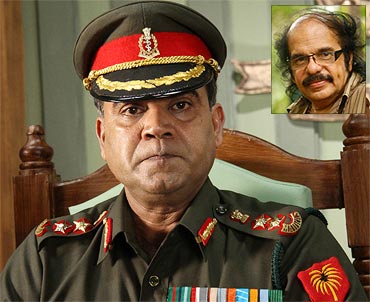
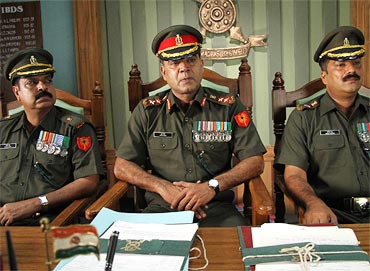
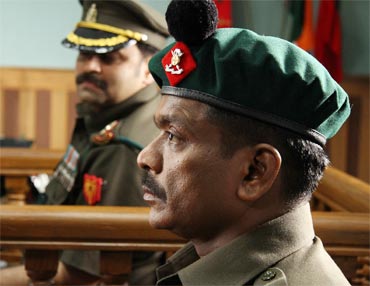
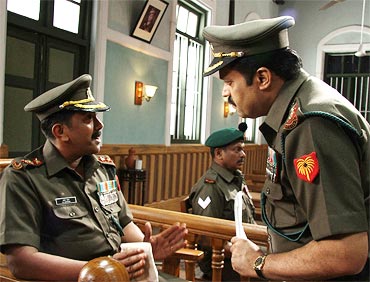
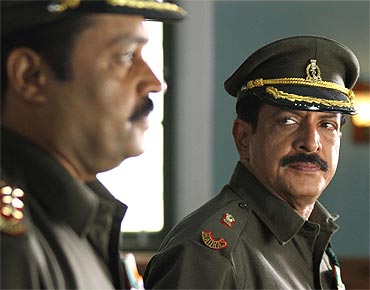
Comment
article